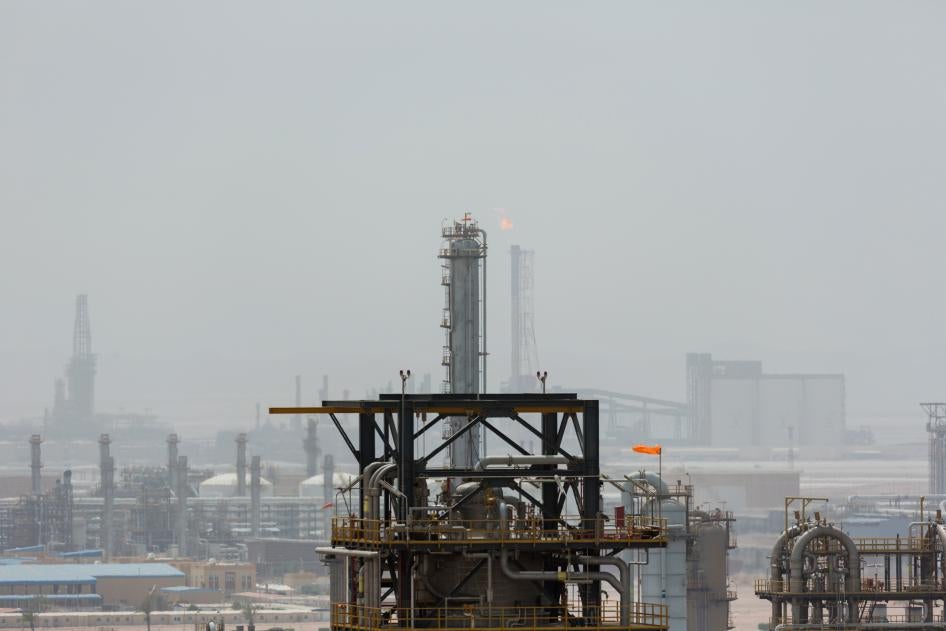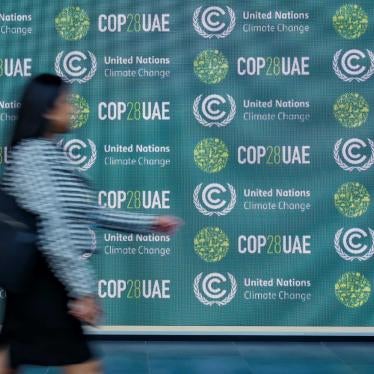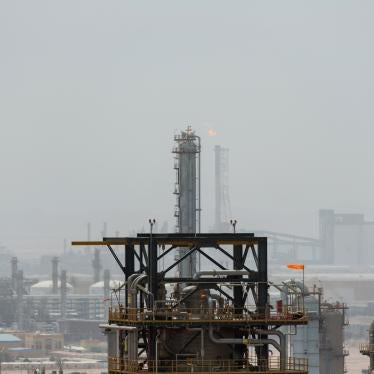(Beirut) – The United Nations should urge the United Arab Emirates to end its human rights repression and eliminate its plans to expand fossil fuel production as countries begin negotiations at the annual UN climate conference in Dubai, Human Rights Watch said today. The UN should also urgently develop criteria for future COP hosts to ensure that civil society can meaningfully participate in global climate negotiations without fear of reprisals.
The UAE will host the 28th Conference of State Parties (COP28) of the United Nations Framework Convention on Climate Change (UNFCCC) from November 30 to December 12, 2023 in Dubai.
“Many climate activists traveling to COP28 are seriously concerned about their own safety in a host country that has jailed people based on their social media posts and makes protest effectively illegal,” said Richard Pearshouse, environment director at Human Rights Watch. “The UNFCCC needs to seriously reflect on how they’ve allowed global climate negotiations to take place in a country where civil society can’t demand ambitious action to phase out fossil fuels without self-censorship or fear.”
Climate activists fears of reprisals are not unfounded. On November 28, James Lynch, a founding co-director of the organization FairSquare, received confirmation that his visa application to attend COP28 was denied. The UAE’s General Directorate of Residency and Foreigners Affairs confirmed to Lynch via email that his application had been rejected. As of writing, Lynch has not received any updates from UAE authorities and it is unclear whether he will be granted entry. In 2015, Lynch, then Amnesty International’s acting head of business and human rights, was refused entry at Dubai airport because of his human rights work.
In the UAE, demonstrations are effectively illegal and criticizing the government is a criminal offense. The executive secretary of the UN Framework Convention signed a COP28 host agreement with the UAE government on August 1, and stated that “there will be space available for climate activists to assemble peacefully and make their voices heard.” However, it is unclear what this commitment means in practical terms given that free speech and protest are severely restricted in the UAE.
The host agreement between the UNFCCC and the UAE has not been publicly released. The lack of transparency and failure of the UN to provide clarity on the risks of criticizing the UAE and protesting during COP28 poses serious dangers to climate activists attending COP28, Human Rights Watch said.
An explicit reference to phasing out all fossil fuels in the COP28 outcome document would be a vital step to prevent the worst outcomes from the climate crisis. But the UAE’s decades-long crackdown on freedom of expression, assembly, and association raises grave concerns about how civil society, activists, human rights defenders, and journalists at COP28 will be able to participate meaningfully and push for ambitious action, including the call to phase out fossil fuels.
In a letter to all UNFCCC parties in mid-November, the UN high commissioner for human rights urged them to “put human rights at the center of all climate decisionmaking.”
The UNFCCC negotiations also risk being undermined by corporate interests of the fossil fuel industry in the host country. The UAE recently announced it was expanding all aspects of its fossil fuel operations, despite a growing consensus that there cannot be new oil, gas, or coal development if governments are to meet global climate targets and protect human rights.
In response to an investigation by the Center for Climate Reporting and the BBC finding that the UAE planned to use its role as the host of UN climate talks as an opportunity to strike oil and gas deals with other countries, the UNFCCC Secretariat said that COP hosts are “expected to act without bias, prejudice, favoritism, caprice, self-interest, preference or deference.” Given that this COP host does not appear to have met those expectations, it’s incumbent on the UNFCCC to insist on a process for future COPs that avoids a similar situation.
To live up to its human rights commitments and to restore credibility in the process, the UNFCCC should press the UAE government to respect the human rights of all COP28 participants, including their right to speak freely, online and offline, and to protest inside and outside the official conference venue.
The UN should also urge the UAE to immediately and unconditionally release all arbitrarily detained activists and human rights defenders, including Ahmed Mansoor, to signal their intention to facilitate robust and rights-respecting climate negotiations before, during, and after COP28. The UN should also address widespread abuses against migrant workers in the UAE, many of whom helped prepare and deliver COP28 but are facing labor abuses, including exorbitant recruitment fees, wage theft, and dangerous exposure to extreme heat.
Migrant workers form 88 percent of the population, and many come from climate vulnerable countries like Bangladesh, Pakistan, and Nepal. As Human Rights Watch has recently documented, abuses UAE-based migrant workers face are linked more broadly to climate-related harm. The UAE also bans trade unions, which inhibits migrant workers’ ability to demand stronger labor protections.
For this and future climate COPs the UNFCCC should also make the host agreement public and ensure that it complies with international human rights law. The UN should set human rights criteria for future COP hosts including an obligation to realize the rights to freedom of speech and assembly that are preconditions to ensure an ambitious COP outcome. The UN should also ensure that interests of the fossil fuel industry do not undermine the credibility and outcome of the negotiations at future COPs.
“The UN has ignored the uncomfortable reality that climate negotiations are being hosted by a deeply repressive country determined to expand its fossil fuel industry,” Pearshouse said. “The least it can do at this stage is to urge the UAE authorities to uphold their human rights commitments towards COP28 participants and human rights defenders behind bars.”









